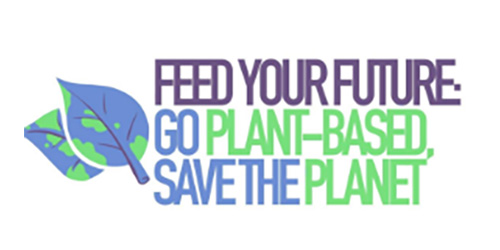Students unite to SHAPE the University's sustainable food offer

Four students from the School of Social Sciences and Humanities are working on a project to demonstrate the importance of the arts, humanities and social sciences in tackling sustainability challenges.
The students, Ellie-May, Frank, Rhianne and Tijan have been accepted for SHAPE Sustainability Impact project, (a collaborative project between the British Academy and Students Organising for Sustainability (SOS)), and have chosen to work with the University to reduce reliance on less sustainable foods and to focus more on plant-based options.
In the following blog, the students outline the purpose and goals of the project and ask for your support.

Why have we chosen this topic?
Climate change is the planet's biggest threat, affecting land and water availability and crop yields at a time when populations are rising fast, periodically causing food crises.
According to the United Nations Climate Change (2023), national climate action plans are still insufficient to accomplish the objectives of the Paris Agreement and keep the rise in global temperature to 1.5 degrees Celsius. The most recent data from the UN's Intergovernmental Panel on Climate Change shows that, in comparison to 2019 levels, greenhouse gas emissions must be reduced by 43% by 2030. We must keep global warming to 1.5 degrees Celsius by the end of the century to prevent the worst effects of climate change, such as more frequent and severe heat waves, droughts, and flooding (United Nations Climate Change, 2023).
The impact of animal farming on our planet
Animal agriculture has long been recognised as a significant contributor to greenhouse gas emissions, playing a substantial role in exacerbating climate change. Let's delve into the various ways in which animal farming impacts the environment and climate, as outlined by recent reports and studies.
Greenhouse gas emissions: Shockingly, livestock are responsible for 18% of global greenhouse gas emissions.
Deforestation: The expansion of animal farming, especially cattle ranching, drives deforestation, particularly in regions like the Amazon rainforest. This deforestation releases stored carbon into the atmosphere, exacerbating climate change. Cattle ranching alone is responsible for 80% of current deforestation in the Amazon, releasing 340 million tons of carbon annually.
Energy intensity: Animal farming is energy-intensive, relying heavily on fossil fuels for activities such as feed production, transportation, and processing.
Water usage: Animal agriculture requires vast amounts of water for drinking, cleaning, and irrigating feed crops. This excessive water usage can lead to water depletion and ecosystem degradation, worsening the effects of climate change.
Land degradation: Intensive animal farming practices can lead to soil erosion and degradation. Additionally, overfishing of depleted fish stocks exacerbates climate change by requiring more fuel-intensive fishing methods.
A call to action for the University of Wolverhampton
Understanding food waste: In the UK, food waste remains a pressing issue, with a staggering 9.5 million tons discarded annually while 8.4 million people grapple with food poverty. The University of Wolverhampton is committed to tackling this challenge head-on by implementing innovative solutions and fostering community engagement.
Becoming a more plant-based University
We are working with catering services to develop a more visible – and tasty – menu of plant-based options to encourage the university community to embrace more sustainable choices. We are not alone. Other Universities, such as Cambridge, Kent and Birmingham are doing the same.
Let's join the movement!
To support this please complete our survey to have your say.
By fostering a culture of sustainability and community involvement, we can work towards a future where our environmental footprint is reduced. Together, let's make a difference!
Read on
If you've been intrigued to learn more about the shift towards vegan and vegetarian diets, you can find the latest statistics from the World Animal Foundation here.
For more information please contact the Corporate Communications Team.


/prod01/wlvacuk/media/departments/digital-content-and-communications/images-2024/240328-Varsity-Line-Up-Resized.jpg)
/prod01/wlvacuk/media/departments/digital-content-and-communications/images-18-19/220325-Engineers_teach_thumbail.jpg)
/prod01/wlvacuk/media/departments/digital-content-and-communications/images-2024/240515-Spencer-Jones-Award-Resized.jpg)
/prod01/wlvacuk/media/departments/digital-content-and-communications/images-2024/240320-Uzbekistan-Resized.jpg)
/prod01/wlvacuk/media/departments/digital-content-and-communications/images-2024/240229-The-Link-Resized.jpg)
/prod01/wlvacuk/media/departments/digital-content-and-communications/images-2024/240516-Andy-Gibson-Resized.jpg)